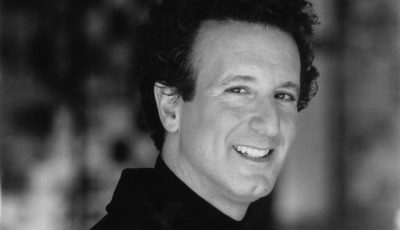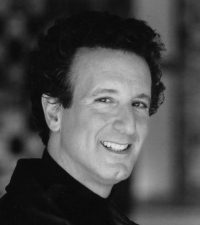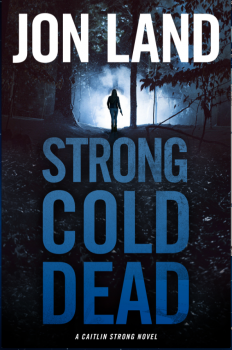

Up Close: Jon Land by David Swatling
Taking a Series to New Heights
Anyone who has attended ThrillerFest knows Jon Land, award-winning author of bestselling novels and nonfiction, including his series featuring Texas Ranger Caitlin Strong. They’ll also recognize him as a tireless whirlwind of energy, whose larger-than-life personality matches his increasingly action-packed thrillers. His latest is certainly no exception.
I met Jon Land at ThrillerFest 2012 when he gave a CraftFest session on pitching a book to agents. His advice: Speak from the heart about why your story means so much to you as a writer, why it demanded to be written. So I thought it would be fun to turn the tables and ask him to give us a pitch for STRONG COLD DEAD.
What makes the eighth story in his series as compelling as the first?
Wow, making me think right off the bat—that’s not fair! Okay, how about this: ISIS comes to Texas and only Caitlin Strong can stop them from unleashing a deadly weapon on American soil, somehow connected to a long-buried mystery on a shadowy Indian reservation. Does that make you want to read the book? As for the second part of your question, what makes STRONG COLD DEAD as compelling as Strong Enough to Die is that the characters are facing different challenges. Caitlin’s surrogate son Dylan, for example, has fallen in love with a Native American girl who may or may not be setting him up. As for Caitlin, well, she has a personal history with one of the book’s primary villains.
You’ve talked in previous Big Thrill interviews about how you developed the character of Caitlin Strong to fill a gap in the market re: women in action thrillers. Now she faces growing competition. Do you have a strategy for keeping her “strong”?
That’s another great question! As the series has progressed, the books have spiraled out into the more traditional action thriller form. The action scenes have gotten bigger, the villains badder, and the plots more devious and potentially devastating—in other words, the stakes have gotten higher across the board and that includes emotionally for the characters. I think it’s fun watching Caitlin deal with the fact that she’s become a living legend. Keeping her “strong” isn’t just about her prowess in bringing down the bad guys, it’s also about how she negotiates the politics of law enforcement and deals with the emotional demands of her lifestyle.
Texas offers a lot as a location. But in this series, the Texas Rangers seem equally important. How intertwined have these two elements become?
Well, Texas is the perfect canvas to write on. It’s so big and broad you can find pretty much anything you need as a writer within its borders. But no other state has anything like the Rangers. It’s not so much the organization that’s become crucial to the series, as the history of the Rangers and the traditions they represent. They’re truly active, living legends. And what my books keep coming back to is that their values and modus operandi really haven’t changed much over the years. That provides Caitlin with both the credibility and responsibility to do all the incredible things she does.
Do you still need to do research for the historical threads that run through the stories in the series?
Let’s use the historical thread (Love that term!) that runs through STRONG COLD DEAD as an example. It features John D. Rockefeller coming to the very same Indian reservation in 1874 that Caitlin does in the present. Rockefeller’s plan to take the oil that runs under the reservation runs him up against Caitlin’s great-great-grandfather, Steeldust Jack Strong. Caitlin finds herself doing pretty much the same thing to an energy mogul who’s after something else that lies on the same land. Now, Rockefeller had very little involvement, if any, with the Texas oil boom. But the historical thread I created is well within the realm of credibility.
Although Rockefeller’s reputation precedes him, did you have any concerns about giving certain unsavory character traits to a real historical figure?
Ah, a perfect follow-up! I think it’s crucial those traits are accurate. John D. Rockefeller wasn’t a nice guy at all, so it’s pretty easy to cast him as a villain. I think it’s important to capture historical figures in their actual context, even though the events and interactions they’re a part of are wholly fictional.
I have to address the other villains in the book: ISIS. Although a very real organization, it would be impossible to research by talking to actual members. So is there a risk of them being what I’m going to call “media stereotypes”?
Hey, do you have any easy questions for me today? (laughs) Let me answer this one two ways: First, sometimes you use those stereotypes to your advantage. The actual ISIS commander in STRONG COLD DEAD, for example, is much more a caricature than a character, the same way Nazis and Soviets once were. He doesn’t have enough screen time to worry about his background and what made him a monster, so I just present him as a monster. The role he’s playing feeds off the media stereotyping because, for the most part, when it comes to extreme villains that stereotyping is accurate. Second, though, would be to contrast my depiction of him with that of Daniel Cross, an abused young man whose hatred and self-loathing turns him into a homegrown terrorist. So stereotyping isn’t something to be avoided, so much as utilized.
Since you wrote this story, more terrorist acts have been committed—some which might be called “successful” from the terrorists’ point of view. While writing, did you think about navigating the delicate boundary between real current events and your fictional ones?
I think thriller writers exploit the most primal fears we all have. I also think exploitation is the right word because, with something like terrorism, we’re taking a tragic trend that’s real and ongoing and using it as a backdrop for our plots. But it’s not so much blurring the line between current and fictional events, as it is having our heroes do in fiction what doesn’t get done in real life. Take the recent truck attack France. If I were writing that scene, Caitlin Strong would have stopped the killer before anyone died. That’s projection, crafting heroes who can do what ordinary people can’t. What I’m trying to do is use reality as the jumping off point for tales in which the good guys win.
A recent Big Thrill article noted a growing interest in Western action thrillers. This series seems to predate that trend. Might you take advantage of this for future storylines in the series?
Wow, you are definitely from the Great Questions School of Interviewing! Can I take you on tour with me? (laughs) I think it was probably No Country for Old Men—the movie more than the book—that started the trend. But it was an easy transition because thrillers owe their form to the Western motif—the loner hero who works outside the system to get things done. I think virtually every single thriller, to varying extents, can be likened to one of the four greatest Westerns ever made: Shane, The Magnificent Seven, High Noon, and The Searchers. My point is this trend had already been happening—we just didn’t necessarily realize it. And it’s allowed the thriller form to grow into something that, thanks to C. J. Box, Lee Child, Brad Thor, Brad Taylor, Vince Flynn, and James Lee Burke among a ton of others, is unabashedly a Western action thriller.
Based of your experience, what advice do you have for writers embarking on a series?
Every book in the series should feel fresh, original, and unique. It should be able to be read out of context, with the reader not feeling he or she has missed anything by starting with a later title—in other words, each book should be able to stand alone on its own merits. Another thing I’d say is to ask yourself how are your recurring characters different from one book to the next? What are the emotional challenges they’re confronting? How are they evolving? For me, aging characters chronologically is the way to go, because keeping them forever young is extremely disingenuous to the reader. A series needs to respect its readers and, to paraphrase Samuel Goldwyn: “Give me the same thing, only different.”
*****
 Jon Land is the USA Today bestselling author of 38 novels, including eight titles in the critically acclaimed Caitlin Strong series: Strong Enough to Die, Strong Justice, Strong at the Break, Strong Vengeance, Strong Rain Falling (winner of the 2014 International Book Award and 2013 USA Best Book Award for Mystery-Suspense), Strong Darkness (winner of the 2014 USA Books Best Book Award and the 2015 International Book Award for Thriller and Strong Light of Day which won the 2016 International Book Award for Best Thriller-Adventure, the 2015 Books and Author Award for Best Mystery Thriller, and the 2016 Beverly Hills Book Award for Best Mystery. The latest title in the series is Strong Cold Dead, to be published on October 4 and about which Strand Magazine said is “certain to rank Land among a handful of our most talented thriller authors of this decade.” Land has also teamed with multiple New York Times bestselling author Heather Graham on a new sci-fi series, the first of which, The Rising, will be published by Forge in January of 2017. He is a 1979 graduate of Brown University and lives in Providence, Rhode Island.
Jon Land is the USA Today bestselling author of 38 novels, including eight titles in the critically acclaimed Caitlin Strong series: Strong Enough to Die, Strong Justice, Strong at the Break, Strong Vengeance, Strong Rain Falling (winner of the 2014 International Book Award and 2013 USA Best Book Award for Mystery-Suspense), Strong Darkness (winner of the 2014 USA Books Best Book Award and the 2015 International Book Award for Thriller and Strong Light of Day which won the 2016 International Book Award for Best Thriller-Adventure, the 2015 Books and Author Award for Best Mystery Thriller, and the 2016 Beverly Hills Book Award for Best Mystery. The latest title in the series is Strong Cold Dead, to be published on October 4 and about which Strand Magazine said is “certain to rank Land among a handful of our most talented thriller authors of this decade.” Land has also teamed with multiple New York Times bestselling author Heather Graham on a new sci-fi series, the first of which, The Rising, will be published by Forge in January of 2017. He is a 1979 graduate of Brown University and lives in Providence, Rhode Island.
To learn more about Jon, please visit his website.
- International Thrills: Johana Gustawsson - October 31, 2017
- International Thrills: Britta Bolt - July 31, 2017
- International Thrills: Anne Holt - May 31, 2017

